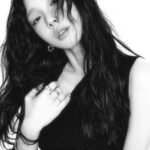Employees at a book printing house in Paju, Gyeonggi Province, are working on the bookbinding of Han Kang’s books
South Koreans have thronged to bookstores to snap up 2024 Nobel laureate Hang Kang’s novels, making her books and even those of her novelist father bestsellers just three days after she won the Nobel Prize in literature last week.
The craze for Han Kang’s books is reinvigorating the moribund book market in South Korea, which logs the most hours on YouTube worldwide.
Her paper book sales skyrocketed by 2,240 times to 310,000 copies as of early Oct. 14 since she was awarded the honorable prize on Oct. 10, according to Yes24, an online bookstore. The figure was compared with her book sales in the same period last year.
Thanks to the unexpected boom, some printing houses are running factories all day. Accumulated sales of the novelist’s books have exceeded 680,000 copies at major bookstores in the country since Oct. 10.
Han Kang speaks at a press conference in November 2023 (Courtesy of Yonhap)
Those in their 40s were the most avid readers of Han’s printed books, making up 34.6% of her paper book sales.
They didn’t bother to line up outside bookshops early in the morning to snatch up her books as soon as the stores open in a so-called open run race.
On Oct. 11, the next day after she won the Nobel Prize, Han’s two highly-recognized books — The Vegetarian and Human Acts – sold 38,000 copies, respectively, at Yes24. That marked the largest single-day sale for a book at the online bookstore.
The 53-year-old novelist became the first South Korean Nobel laureate in literature. She was also the first Korean winner of the Booker Prize, awarded for her cult novel The Vegetarian in 2016.
Her books swept the top 10 bestsellers, including printed copies and eBook, since Oct. 10.
Han’s eBook sales soared 667 times during the Oct. 10-13, led by readers in their 30s, accounting for 32.6% of her eBook sales. That compared with the year-earlier period.
Sales of her translated books shot up 1,600 times, led by those in their 50s.
Han Kang’s books were restrocked at Kyobo Bookstore on Oct. 14, 2024 (Courtesy of Yonhap)
Some readers felt unfamiliar with her writing style, especially the way she describes violent scenes and hard to digest them because of their heavy subjects. Except The Vegetarian, Human Acts and We Do Not Part were rooted in modern Korean history under autocratic regimes.
They are now giving another shot to read them through.
Meanwhile, her father and well-known novelist Han Seung-won also enjoyed a surge in his book sales over the past four days.
By Mi-Nah Lee
helper@hankyung.com
Yeonhee Kim edited this article















